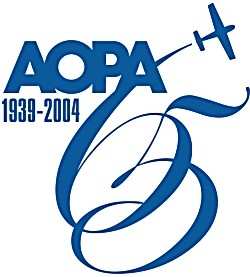AOPA Asks Questions, Gets Answers From Presidential
Candidates
(In a continuing effort to get the presidential candidates
on record about issues important to general aviation, AOPA asked
both President George W. Bush and Senator John Kerry for some
specific answers. This is the first of a two-part story on where
both men stand --ed.)
Incumbent President George W. Bush
 AOPA: What is your
experience with general aviation? How have you personally used
general aviation?
AOPA: What is your
experience with general aviation? How have you personally used
general aviation?
Mr. Bush: Long before I entered public office
in Texas, I flew F-102 fighters in the Texas Air National Guard.
When I campaigned for governor of Texas, I regularly used general
aviation to fly across Texas. Later, as governor, I frequently used
State Aircraft Pooling Board planes to conduct official business
throughout the state. I know many people depend on general aviation
to carry out their day-to-day responsibilities, and general
aviation operators play a vital role in our economy.
AOPA: As an elected official, what is the most
important action you have taken to support general aviation?
Mr. Bush: General aviation is a vital component
of our nation's transportation system. Last year, I signed Vision
100 — Century of Aviation Reauthorization Act, a four-year,
$59 billion bill to make improvements at commercial and general
aviation airports and to upgrade our air traffic control
capability.
AOPA: Airports are essential in accessing the
national air transportation system, but are often faced with the
threat of closure or limits on access. Do you support general
aviation airports as part of the national airport system?
Mr. Bush: General aviation is an important part
of our economy, and continued investment in civilian airports is
central to our economic growth. My 2005 budget includes $3.5
billion in federal funding for the Airport Improvement Program
(AIP), which provides grants for airports to work on projects
related to enhancing airport safety, capacity, security, and
environmental concerns. And the FAA operates a shared system of air
traffic control and navigation to keep civil, commercial, and
military aircraft safe in the skies.
AOPA: Post 9/11, some have singled out general
aviation, in comparison to other transportation modes, as a
security concern. How do you view general aviation security?
 Mr. Bush: The terrorist
attacks of September 11 served as a wakeup call for America. We
have introduced new security efforts to keep our homeland and modes
of transportation safe for our citizens and safe from future
attacks. The federal government has taken steps to secure both
commercial and general aviation.
Mr. Bush: The terrorist
attacks of September 11 served as a wakeup call for America. We
have introduced new security efforts to keep our homeland and modes
of transportation safe for our citizens and safe from future
attacks. The federal government has taken steps to secure both
commercial and general aviation.
We have asked the Aviation Security Advisory Committee (ASAC) to
establish a working group made up of industry stakeholders to
develop guidelines for security enhancements at the nation's
privately and publicly owned and operated general aviation
facilities. This listing of recommended guidelines or "best
practices" is designed to establish nonregulatory standards for
general aviation airport security.
My administration has found that general aviation operators are
keenly aware of and willing to individually enhance the security of
their operations without government regulation. For example, AOPA
developed the nationwide Airport Watch program, which includes
warning signs for airports, informational literature, and a
training videotape to educate pilots and airport employees about
how the security of their airports and aircraft can be enhanced.
Through the efforts and recommendations of the industry, we are
making aviation a more secure and effective means of
transportation.
AOPA: Industry observers, think tanks, and some
airlines have proposed a variety of management structures for FAA's
air traffic control system. Do you believe air traffic control is a
government function or should be spun off to the private
sector?
Mr. Bush: Effective management of the air
traffic control system is essential to ensuring the safety and
security of all Americans. While there is room for improvement in
our current system, Secretary of Transportation Norman Mineta has
determined that air traffic control is a core capability of the
federal government. Activities such as the contract tower program
will continue, but by and large the air traffic control system will
continue to be run by the federal government. I will continue to
work with the FAA to improve the air traffic control system through
advanced technology and comprehensive communications. FAA
Administrator Blakey has said that the administration has no plans
to privatize the air traffic control system.
AOPA: General aviation is very sensitive to
cost and access to the air traffic control system. How will you
work to address these concerns of general aviation pilots?
Mr. Bush: With increased airport security, I
understand that there are many additional costs associated with air
travel. To help relieve some of this burden, I signed legislation
that will increase federal funding of the air traffic control
system. Vision 100 — Century of Aviation Reauthorization Act
authorizes $59 billion for FAA programs through 2007 — a
31-percent increase in funding over the past four-year
authorization. The Air Traffic Organization of FAA is working to
reduce congestion and delays that impose efficiency costs on
general aviation and commercial aviation alike. We are pursuing
these improvements while avoiding increases in fees and taxes
imposed on general aviation.

The administration recognizes that access issues are of major
concern to the general aviation community, and is working with the
general community to address these issues in ways that do not
compromise homeland security. For example, the FAA has worked with
AOPA to establish a Web-based notification system that includes
graphical depictions of new airspace restrictions in response to
concerns about restrictions imposed with little notice.
AOPA: Several other countries operate using a
system that charges based on each component of a flight, replacing
the US model that uses a transparent aviation fuel and ticket taxes
to fund the aviation system. What is your view of how to fund the
aviation system?
Mr. Bush: Our National Airspace System is
predominantly funded through a combination of ticket taxes and
segment charges on commercial flights, along with fuel charges on
the entire aviation community. In addition, there is a substantial
contribution to FAA expenses from the general revenues of the
federal government. This combination of funding sources is meant to
distribute costs among the various users of the airspace system.
Reliance on such a combination is appropriate and should be
continued.
AOPA: During the next term you would be
nominating an FAA administrator. What qualities would you look for
in a nominee?
Mr. Bush: As president, I seek to appoint
highly qualified, ethical candidates to top administrative posts.
In picking appointees, I consider a person's experience as well as
their relevant knowledge. Marion Blakey has served ably as my FAA
administrator since September 2002. She oversees a very complex
organization with crucial homeland security and public-safety
responsibilities, and has worked closely with private and
commercial aviation interests to ensure that our airspace is safe,
efficient, and accessible.
 ANN's Daily Aero-Linx (04.16.24)
ANN's Daily Aero-Linx (04.16.24) Aero-News: Quote of the Day (04.16.24)
Aero-News: Quote of the Day (04.16.24) Airborne 04.10.24: SnF24!, A50 Heritage Reveal, HeliCycle!, Montaer MC-01
Airborne 04.10.24: SnF24!, A50 Heritage Reveal, HeliCycle!, Montaer MC-01 Airborne 04.12.24: SnF24!, G100UL Is Here, Holy Micro, Plane Tags
Airborne 04.12.24: SnF24!, G100UL Is Here, Holy Micro, Plane Tags Airborne-Flight Training 04.17.24: Feds Need Controllers, Spirit Delay, Redbird
Airborne-Flight Training 04.17.24: Feds Need Controllers, Spirit Delay, Redbird





